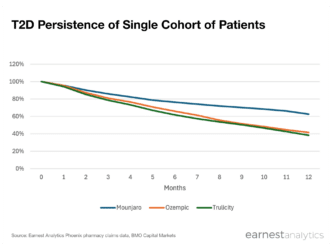Amazon and Online Shopping Emerge as Black Friday Week’s Biggest Winners

One of retail’s biggest shopping weeks — Black Friday and Cyber Monday — has come and gone, racking up credit card bills in its wake. For our Black Friday 2018 analysis, we looked at the spend of millions of anonymous U.S. consumers over the week of Black Friday and Cyber Monday to uncover the biggest trends and takeaways of the early holiday season.
Here’s what we saw:
- Amazon gained market share against Best Buy, Walmart and Target
- Shoppers spent more on average at their favorite stores than last year
- Kohl’s was a clear winner among department stores
- Overall spend continues to move online
Free Shipping for all Seals the Deal for Amazon
Amazon’s stellar performance over Black Friday week came as no surprise this year. The massive online retailer surpassed its own sales records this Cyber Monday, driving 39% of total sales among big box retailers Walmart, Target and Best Buy. In addition to big discounts and promotions, Amazon’s decision to offer free holiday shipping to all customers, regardless of order size or membership status may have helped steal a few market share points from Walmart, who did not offer free shipping for orders below $35. On a year over year basis, Amazon gained nearly 7 points of market share this year against Walmart, Target and Best Buy.

Best Buy did not repeat its strong 2016-2017 market share gains, +2 percentage points across the big box retailers. In 2018, the electronics retailer held 9.6% of Black Friday sales compared to 11.4% the year before. Earnest data continues to monitor whether Best Buy will return to 2017 market share levels as the holiday season progresses.
Better Deals Lead to Higher Spending
The heavy promotions over Black Friday and Cyber Monday week resulted in shoppers spending more than usual at their favorite retailers. Based on our customer spend analysis, comparing the variance in spending between the week of Black Friday to average customer spend per week — Amazon, Best Buy and Target all saw a dramatic uptick in spending.
Among this group, Amazon shoppers’ Black Friday to Cyber Monday week spend was $125, or 52% larger than their average weekly spend on the e-commerce platform. Best Buy, known for larger ticket items, touted the highest average spend during Black Friday week at $247, which was 46% more than shoppers generally spend at Best Buy during a non-holiday week.

Rounding out the top three winners for biggest increase in spend was Target, where customers shelled out 35% more over Black Friday week, spending about $112 on average. Upholding its philosophy of everyday low prices, Walmart customers did not spend significantly more than usual, only increasing average spend by 8% over the holiday shopping week.
Kohl’s Does it Again
Kohl’s stood out as a clear winner among department store sales for the second year in a row, following a strong 2017 performance last holiday season. Kohl’s led the mid-tier category in average customer spend growth, up 27% vs. an average retail week, surpassing its closest competitors — Macy’s and J.C. Penney. Among luxury retailers, Bloomingdales and Saks succeeding in getting shoppers to increase their spending over the holiday week at 16% and 9% respectively.

Spending Moves Online
While Amazon’s continued partnership with Kohl’s may have contributed to a strong holiday sales season for the retailer so far, a shift to higher online sales vs. in-store sales was another major driver. As Macy’s and J.C. Penney lost online share in 2018 over the cyber shopping week, Kohl’s online sales climbed nearly 1.5 points to 33.7%, cementing their leadership hold for online sales among department stores.

Earnest data tracked a notable trend of Black Friday week shoppers moving their spend online from physical stores. Neiman Marcus showed a significant shift to online in 2018, with online sales making up 58% of the luxury retailer’s total sales over Black Friday week. Nordstrom online sales also grew slightly from the previous year, while Macy’s and J.C. Penney’s online sales were flat over the holiday shopping week.

Was sales performance between Black Friday and Cyber Monday a sign of what’s to come for the remainder of the holiday season? Follow us on Medium for more updates on consumer spending during the holidays.
Black Friday / Cyber Monday week is categorized as the week beginning Thanksgiving Thursday and ending the following Wednesday.











